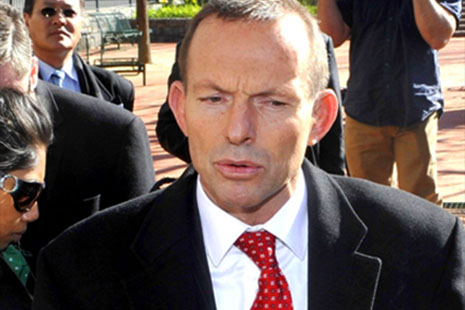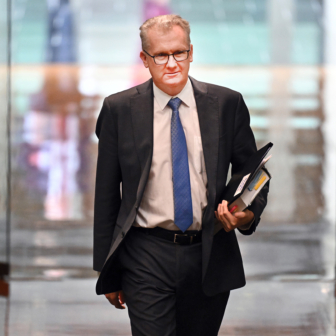SINCE his “rock star” reception in a South East Queensland primary school on day one of the election campaign, Tony Abbott seems to have had a dream run in this part of the country. At the Liberal campaign launch in Brisbane last weekend, his message was essentially: “You can have the Howard government back again, no worries.” As a skilled salesman, he wouldn’t use a pitch like that unless he was convinced the customers were ready to take the goods to the checkout. But although the signs are that Queensland has been leading the way in a strong turn against Labor, the electorate here is in an unstable mood, responding to issues that pull in contrary directions.
As both major parties chase the vote in the south-east sector, a bid to secede from Queensland is under way in the north, led by Bob Katter. The move attracted 98 per cent support among delegates at a recent meeting of the local government association. A street poll conducted by the Warwick Daily News in the state’s south found, not surprisingly, a balance of opinion falling just as heavily the other way. Whatever will please the resource-rich north, it seems, will displease the population-rich south. From a government point of view, this is a no-win situation. Both state and federal governments are Labor at present, so it is Labor that is taking the flack.
On specific policy issues, the state is also both literally and metaphorically a minefield. Take the Toowoomba bypass, for example. The proposal for a second highway over the range has been on the agenda for decades, and the escalating activity associated with mining ventures in the Surat Basin has given a new urgency to the demand for its completion. The problem is cost.
The most recent estimate from the Royal Automobile Club of Queensland puts this between $1.3 and $1.8 billion, and the consensus figure in the local press is $1.7 billion. The Howard government committed $33.25 million, but the state government was unable to broker a viable funding deal and abandoned the project. Abbott’s recent pledge of further support is being widely reported at $700 million and treated as if it is tantamount to a go-ahead. “Abbott: I’ll Build Toowoomba Bypass” was a headline quote on the front page of Queensland Country Life. Given the actual funding breakdown in the formal Coalition commitment, Abbott may indeed be doing it himself. Just $50 million is allocated for 2011, $80 million in 2012, and $150 million in 2013–14. The remaining $420 million is for the next term of office, in 2014–15.
Curiously, Abbott has not had to field questions about the logical relationship between the funding shortfall for the bypass and the proposal for a resource super-profits tax. Siding with the mining companies in the stand-off that claimed Rudd’s scalp has so far left him unscathed, though it is a high-risk strategy, especially in Queensland.
A groundswell of local animosity is building against the dominance of mining interests in the Surat Basin. This is led by farmers who are concerned about the loss of prime agricultural land. A billboard with the slogan “Coal for Breakfast” is mounted on the Warrego Highway on the outskirts of Dalby. Unprecedented alliances are being forged between the farming community and environmentalists. Drew Hutton, formerly a candidate for the Queensland Greens, has resigned his party membership to devote himself full-time to the campaign against the expansion of coal seam gas ventures. Protesters have set up a blockade at Tara in the Darling Downs, to prevent further seismic testing for a gas pipeline.
The ongoing furore over groundwater contamination from the underground coal gasification plant at Kingaroy demonstrates how readily public trust in the mining companies can give way, and how much resentment seethes beneath the dependency relationship. Attitudes to the industry as a whole are volatile and ambivalent. When Xstrata responded to the proposed tax with the threat to suspend work on its open-cut coal project at Wandoan, the public outcry over the loss of jobs went against the Rudd government, but Xstrata’s own tactics could backfire. Threats do not generate goodwill and reminders of total dependency do not support the industry rhetoric of partnership and mutual respect.
This conundrum was highlighted in the mining industry’s most recent anti-tax advertisements, which featured an assortment of people being knocked flying: an elderly woman drinking a cup of tea, a waiter carrying a tray, a woman with a bag of shopping. The accompanying jingle, “You’re gonna get whacked” unintentionally carried a double message: you’ll get whacked by the tax, but we’re the hitmen. How helpful is it for the Coalition to be associated – even aligned – with this kind of intimidation?
Simon Bennison, who authorised the campaign on behalf of the Association of Mining and Exploration Companies, has devoted much of his energy for the past few years to getting state government approval processes fast-tracked in Western Australia. The state government in Queensland, however, is being roundly condemned for too readily giving the go-ahead to experiments in underground coal gasification and coal seam gas. The electoral dramaturgy works against incumbent governments, who must serve as the scapegoats for public ambivalence and resentment over what is essentially an irresolvable dilemma.
So far, the Coalition is managing to sustain a profoundly contradictory position without having to respond to any hard questions. But if he wins the election, Abbott will find himself in deep waters. He will be faced with a set of issues for which there is no clear resolution, and which have the potential to generate a heated backlash, whichever way his government decides to manage them. •




